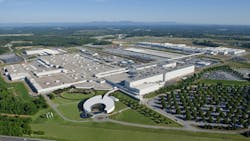GREENVILLE, S.C. -- As a leader, sometimes not having the answers is okay.
In fact, in the eyes of Rich Morris, it’s a sign of strength within a company.
Morris, vice president of assembly for BMW Manufacturing Co., on Tuesday in his keynote address at the 2013 IndustryWeek Best Plants conference championed the individual as major force in a company’s drive to achieve sustainable growth.
Sustainable growth, he said, is best achieved through the crafting of an adaptive organization filled with players empowered to see and make change.
“In a truly adaptive organization, problem solving is closest to the problem, and therefore it’s the individuals in the company that are making the thousands of incremental improvements every day that adds up to sustained profitable growth. When it comes down to it, it’s all about individuals and their ideas,” Morris said.
This school of thought seems to be working for BMW (IW 1000/36), which operates 29 sites in 14 countries.
In Spartanburg, S.C., where BMW operates its only manufacturing facility in North America, the company’s plant has undergone five expansions since it opened in 1994. The facility today dwarfs the original footprint, covering 5 million square feet, compared to the 1 million square feet it used to occupy.
And it boasts more than 7,000 workers (whom Morris refers to as associates), a far cry from the 700 people it employed nearly 20 years ago, and plans to soon hire another 1,000 more.
Strategy Number ONE
To achieve such results, BMW in 2007 rolled out a sustainable growth plan – Strategy Number ONE.
Under this plan, BMW developed a new value-oriented production system that would increase the company’s efficiency and flexibility. The system, designed to be sustainable, had a net result of doubling the company’s business in Spartanburg.
“This can only be achieved by an adoptive organization with a culture of respect for the individual,” Morris said.
That philosophy, which now is fundamental to BMW’s culture, is part of the core of Toyota, too, an automobile manufacturer often looked to for leadership guidance.
Quoting Toyota, Morris said: “Most automobile manufacturers build good cars. We build good people. They build good cars.”
To create that sustainable culture and network of engaged and empowered employees, Morris offered a few tips he gleaned from implementing the new sustainable growth plan.
- Set a clear vision.
- Be role models and live the principles of your company.
- Coach and mentor your people.
- Move the obstacles that are in their way.
- Promote the right people.
- Understand and accept that at some point, you will not be the most knowledgeable person.
In that way, leaders develop strong organizations that are not dependent on any one person for their strength and growth, he said. Rather, the organization is adaptable and as strong as the collective knowledge and innovation of its people.
“I believe it’s our jobs as leaders to leave our organizations better off than we found them,” Morris said. “As a leader, what legacy are you leaving your organization?”
About the Author
Ginger Christ
Ginger Christ, Associate Editor
Ginger Christ is a former associate editor for EHS Today, a Penton publication.
She has covered business news for the past seven years, working at daily and weekly newspapers and magazines in Ohio, including the Dayton Business Journal and Crain's Cleveland Business.
Most recently, she covered transportation and leadership for IndustryWeek, a sister publication to EHS Today.
She holds a bachelor of arts in English and in Film Studies from the University of Pittsburgh.
